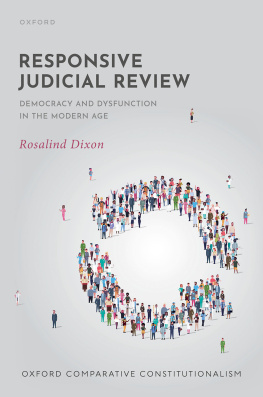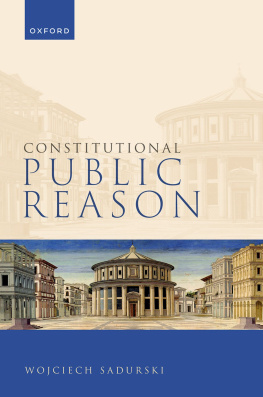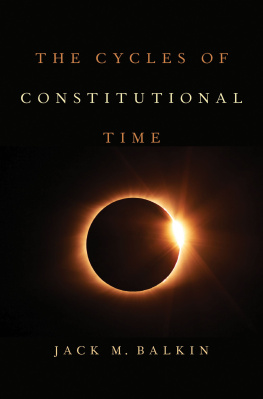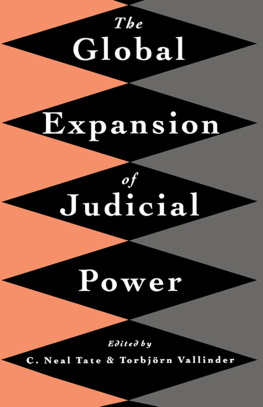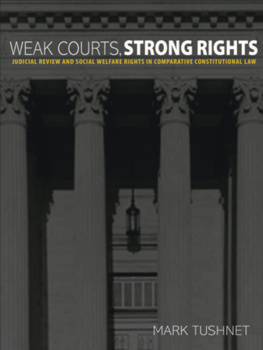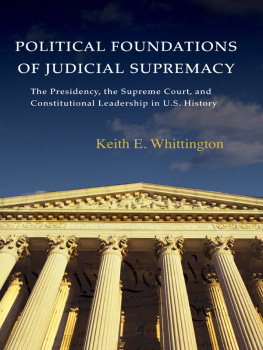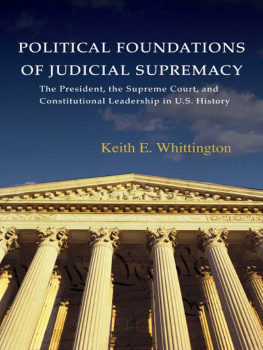OXFORD COMPARATIVE CONSTITUTIONALISM
Series Editors
RICHARD ALBERT
William Stamps Farish Professor of Law,
The University of Texas at Austin School of Law
ROBERT SCHTZE
Professor of European and Global Law,
Durham University and College of Europe
Responsive Judicial Review
OXFORD COMPARATIVE CONSTITUTIONALISM
Series Editors
Richard Albert, William Stamps Farish Professor of Law,
The University of Texas at Austin Law School
Robert Schtze, Professor of European and Global Law,
Durham University and College of Europe
Comparative constitutional law has a long and distinguished history in intellectual thought and in the construction of public law. As political actors and the people who create or modify their constitutional orders, they often wish to learn from the experience and learning of others. This cross-fertilization and mutual interaction has only accelerated with the onset of globalization, which has transformed the world into an interconnected web that facilitates dialogue and linkages across international and regional structures. Oxford Comparative Constitutionalism seeks to publish scholarship of the highest quality in constitutional law that deepens our knowledge of local, national, regional, and global phenomena through the lens of comparative public law.
Advisory Board
Denis Baranger, Professor of Public Law, Universit Paris II Panthon-Assas
Wen-Chen Chang, Professor of Law, National Taiwan University
Roberto Gargarella, Professor of Law, Universidad Torcuato di Tella
Vicki C Jackson, Thurgood Marshall Professor of Constitutional Law, Harvard Law School
Christoph Mllers, Professor of Public Law and Jurisprudence, Humboldt-Universitt zu Berlin
Cheryl Saunders A.O., Laureate Professor Emeritus, Melbourne Law School
ALSO PUBLISHED IN THIS SERIES
Deliberative Peace Referendums
Ron Levy, Ian OFlynn, Hoi L. Kong
Eternity Clauses In Democratic Constitutionalism
Silvia Suteu
Scales of Memory
Constitutional Justice and Historical Evil
Justin Collings
The Global South and Comparative Constitutional Law
Edited by Philipp Dann, Michael Riegner, and Maxim Bnnemann
City, State
Constitutionalism and the Megacity
Ran Hirschl
Constitutional Change In The Contemporary Socialist World
Ngoc Son Bui
Polands Constitutional Breakdown
Wojciech Sadurski
Abusive Constitutional Borrowing
Rosalind Dixon and David Landau

Great Clarendon Street, Oxford, OX2 6DP,
United Kingdom
Oxford University Press is a department of the University of Oxford. It furthers the Universitys objective of excellence in research, scholarship, and education by publishing worldwide. Oxford is a registered trade mark of Oxford University Press in the UK and in certain other countries
Rosalind Dixon 2023
The moral rights of the author have been asserted
First Edition published in 2023
Impression: 1
All rights reserved. No part of this publication may be reproduced, stored in a retrieval system, or transmitted, in any form or by any means, without the prior permission in writing of Oxford University Press, or as expressly permitted by law, by licence or under terms agreed with the appropriate reprographics rights organization. Enquiries concerning reproduction outside the scope of the above should be sent to the Rights Department, Oxford University Press, at the address above
You must not circulate this work in any other form and you must impose this same condition on any acquirer
Public sector information reproduced under Open Government Licence v3.0
(http://www.nationalarchives.gov.uk/doc/open-government-licence/open-government-licence.htm)
Published in the United States of America by Oxford University Press
198 Madison Avenue, New York, NY 10016, United States of America
British Library Cataloguing in Publication Data
Data available
Library of Congress Control Number: 2022934445
ISBN 9780192865779
eISBN 9780192689719
DOI: 10.1093/oso/9780192865779.001.0001
Links to third party websites are provided by Oxford in good faith and for information only. Oxford disclaims any responsibility for the materials contained in any third party website referenced in this work.
Acknowledgments
This book has been a long time in the making. In many places it draws on work I did during my doctorate/SJD at Harvard under the generous supervision of Frank Michelman, Martha Minow, Richard Fallon, Richard Goldstone, and Jacqui Bhabha. It also reflects time spent thinking and writing as an assistant professor and professor at the University of Chicago and University of New South Wales (UNSW) in Sydney, as well as during several visits as a visiting professor/fellow at Chicago, Harvard, and Columbia Law Schools. The attention in the book to the realities of democratic politics, and various possibilities for democratic experimentalism, is largely due to the intellectual influence of the University of Chicago and Columbia Law School. The enthusiasm for ideas about responsive law and regulation is shaped by many generous colleagues at UNSW, especially Theunis Roux and Martin Krygier.
The comparative method, and sensibility, I owe to many people around the world both near and farincluding colleagues at UNSW and Melbourne, many fellow members of the International Society of Public Law. Many of the ideas have also been shaped by valuable conversations over many years with colleagues such as Richard Albert, Micaela Alterio, Gabrielle Appleby, Ori Aronson, Ben Berger, Carlos Bernal Pulido, Nina Boughey, Sean Brennan, Dan Brinks, Jessica Bulman Pozen, Lisa Buton Crawford, Cora Chan, Adam Chilton, Mathilde Cohen, Victor Comella, Joel Colon Rios, Adam Cox, Javier Cuoso, Grainne de Burca, Maartje de Visser, Sujit Choudhry, Melissa Crouch, Erin Delaney, Evelyn Douek, Anna Dziedic, Richard Fallon, James Fowkes, Stephen Gardbaum, Roberto Gargarella, Conor Gearty, Claudia Geiringer, Jake Gersen, Tom Ginsburg, Mark Graber, Jamal Greene, Michaela Hailbronner, Andrew Harding, Ran Hirschl, Aziz Huq, Helen Irving, Samuel Issacharoff, Vicki Jackson, Aileen Kavanagh, Tarunabh Khaitan, Madhav Khosla, Paul Kildea, Jeff King, Heinz Klug, David Landau, David Law, Hanna Lerner, Daryl Levinson, Sandy Levinson, Ron Levy, Peter Leyland, Vanessa MacDonnell, Frank Michelman, Martha Minow, Sarah Murray, Jaclyn Neo, Roberto Niembro, Aoife Nolan, Kate ORegan, Will Partlett, Rick Pildes, Iddo Porat, Eric Posner, David Pozen, Kent Roach, Yaniv Roznai, Ruth Rubio, Wojciech Sadurksi, Adam Samaha, Cheryl Saunders, Jeff Seton, Amelia Simpson, James Stellios, Scott Stephenson, Kristen Stilt, Adrienne Stone, Lior Strahilevitz, David Strauss, Julie Suk, Mark Tushnet, Mariana Velasco Rivera, Sergio Verdugo, Mila Versteeg, Joseph Weiler, Lulu Weis, and Po Jen Yap, among many others. I am especially grateful to David Dyzenhaus for encouraging me to return to work on the book after a long delay, and to Mark Tushnet for his encouragement and guidance at many different stages of the project.
The book also reflects the intellectual debt I owe to a number of close colleagues and co-authors. The book inevitably reflects and has parallels with the work of many of those scholars who I most admire in the field, and it draws explicitly at a number of points on ideas developed in joint-authored work with Michaela Hailbronner, Samuel Issacharoff, Richard Holden, Amelia Loughland, Theunis Roux, Adrienne Stone, Mark Tushnet, and especially David Landau, and I am particularly grateful to these co-authors for so many helpful conversations and their permission to draw on those ideas as part of this project.

